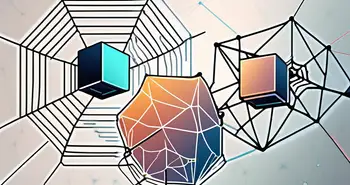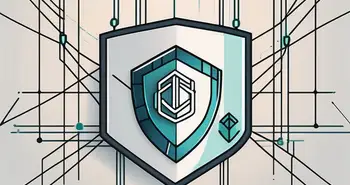Exploring the Ethereum Use Cases

As an expert in the field of blockchain technology and cryptocurrencies, I am excited to take you on a journey to explore the various use cases of Ethereum. Ethereum is not just another cryptocurrency; it is a groundbreaking platform that has revolutionized the way we think about decentralized applications and smart contracts. Join me as we dive into the basics of Ethereum, its role in the world of finance, its impact on the gaming industry, and much more.
Understanding Ethereum and Blockchain Technology
Before delving into the specific use cases of Ethereum, it's essential to grasp the fundamentals of this revolutionary technology. Ethereum is a decentralized platform that utilizes blockchain technology. It allows developers to build and deploy smart contracts and decentralized applications (DApps) on its network.
Blockchain, the underlying technology of Ethereum, is a decentralized ledger that records transactions in a transparent and immutable manner. Unlike traditional centralized systems, blockchain relies on a network of computers, called nodes, to maintain consensus and validate transactions.
The Basics of Ethereum
Ethereum, created by the renowned programmer Vitalik Buterin, was launched in 2015. It introduced the concept of programmable money, enabling developers to write code that automates the execution of contracts, eliminating the need for intermediaries.
Ethereum's native currency, Ether (ETH), serves as both a digital asset and a fuel for executing transactions and running smart contracts on the platform. With Ethereum, developers can create and deploy applications that operate in a trustless and censorship-resistant environment.
The Role of Blockchain in Ethereum
Blockchain technology is the backbone of Ethereum, providing a secure and transparent environment for executing smart contracts. The blockchain ensures that every transaction and contract on the Ethereum network is recorded and verified by multiple nodes within the network.
This decentralized nature of blockchain technology eliminates the need for intermediaries, making transactions and contracts more efficient and cost-effective. Additionally, blockchain's immutability ensures that once a transaction or contract is recorded on the Ethereum network, it cannot be altered or tampered with, enhancing security and trust.
Ethereum as a Cryptocurrency
While Ethereum's primary purpose is not solely as a cryptocurrency, Ether (ETH) plays a vital role within the Ethereum ecosystem. Let's explore the key differences between Ethereum and Bitcoin and understand the value of Ether in the market.
Ethereum vs Bitcoin: Key Differences
Ethereum and Bitcoin are two distinct cryptocurrencies, each with its own unique features and use cases. While Bitcoin primarily serves as a digital currency and a store of value, Ethereum focuses on facilitating smart contracts and decentralized applications.
Ethereum's blockchain is more programmable and versatile than Bitcoin's, allowing developers to create complex applications that go beyond simple transactions. This flexibility has led to the rise of decentralized finance (DeFi), non-fungible tokens (NFTs), and other innovative applications built on the Ethereum network.
The Value of Ether in the Market
Ether (ETH), the native cryptocurrency of the Ethereum network, has experienced remarkable growth since its launch. At the time of writing, Ether is one of the largest cryptocurrencies by market capitalization, and its value has soared due to the increasing demand for decentralized applications and the rise of the NFT market.
Investors and cryptocurrency enthusiasts recognize the value of Ether as a key component of the Ethereum ecosystem. As the Ethereum network expands and more DApps are developed, the demand for Ether is expected to increase, potentially driving its value even higher in the future.
Smart Contracts and Decentralized Applications (DApps)
One of Ethereum's standout features is its ability to facilitate smart contracts and decentralized applications. Let's dive deeper into the power of smart contracts and how DApps are reshaping the digital landscape.
The Power of Smart Contracts
Smart contracts are self-executing contracts with the terms of the agreement directly written into code. They automatically execute when predetermined conditions are met, eliminating the need for intermediaries and providing a transparent and trustless environment.
Smart contracts on the Ethereum network have tremendous potential across various industries. They can be used for financial transactions, supply chain management, decentralized governance, and much more. By automating and digitizing contract execution, smart contracts can significantly reduce costs and increase efficiency.
How DApps are Changing the Digital Landscape
Decentralized applications (DApps) are applications that run on a blockchain network, providing users with increased security, privacy, and control over their data. Built on Ethereum, DApps bring transparency and trust to various industries.
DApps are transforming industries such as finance, gaming, real estate, and art. They enable peer-to-peer transactions, eliminate the need for intermediaries, and offer new opportunities for developers and users alike. The decentralization aspect of DApps empowers individuals, giving them ownership and control over their digital assets and data.
Ethereum in Finance: DeFi and Beyond
Ethereum's impact on the financial sector goes beyond traditional banking systems. With the rise of decentralized finance (DeFi) and the tokenization of assets, Ethereum is revolutionizing how we perceive and interact with money.
The Rise of Decentralized Finance (DeFi)
Decentralized finance (DeFi) refers to a set of financial applications built on blockchain networks like Ethereum. DeFi eliminates the need for intermediaries such as banks and brokers, allowing individuals to have complete control over their finances.
With DeFi, users can lend, borrow, and earn interest with cryptocurrency assets, all without relying on centralized institutions. This democratization of finance opens up opportunities for individuals who were previously excluded from traditional financial systems.
Ethereum's Role in Tokenization
Tokenization is the process of representing real-world assets, such as real estate or artwork, as digital tokens on a blockchain network. Ethereum provides a platform for creating and trading these tokens, offering increased liquidity and accessibility to previously illiquid assets.
Tokenization enables fractional ownership, making it easier for individuals to invest in high-value assets. With Ethereum's blockchain acting as the underlying infrastructure, tokenization offers transparency, security, and immutability, revolutionizing the way we invest and transfer ownership.
Ethereum in the Gaming Industry
Beyond its impact on finance, Ethereum is making waves in the gaming industry. The integration of cryptocurrency and blockchain technology is transforming the way games are developed, played, and monetized.
Crypto Gaming and Ethereum
Crypto gaming encompasses games that utilize blockchain technology and cryptocurrency for in-game transactions and ownership. Ethereum's blockchain provides a secure and transparent environment for crypto gaming, giving players true ownership of their in-game assets.
By leveraging Ethereum, game developers can create unique digital items, known as non-fungible tokens (NFTs), that can be traded and owned by players. This innovative approach adds value to the gaming experience, as players can truly own and monetize their virtual assets.
NFTs and Digital Ownership
Non-fungible tokens (NFTs) are digital assets that represent ownership or proof of authenticity of a unique item, such as artwork, virtual land, or collectibles. Ethereum's blockchain has become the go-to platform for NFT creation and trading.
NFTs have gained significant attention in recent years, with high-profile sales and digital art collections making headlines. They provide a new way for artists, creators, and collectors to interact and monetize their work, removing the need for intermediaries and increasing transparency in the art market.
As an expert in the field, I have witnessed firsthand the transformative power of Ethereum. From facilitating smart contracts and decentralized applications to reshaping traditional industries such as finance and gaming, Ethereum is driving innovation and empowering individuals worldwide.
Whether you're a developer, investor, or simply curious about the future of technology, Ethereum offers a myriad of use cases that are sure to capture your interest. It's an exciting time to be part of this technological revolution, and I encourage you to explore the limitless possibilities that Ethereum presents.
FAQ
What is Ethereum?
Ethereum is a decentralized platform that utilizes blockchain technology to enable the creation and execution of smart contracts and decentralized applications (DApps). It introduced the concept of programmable money, revolutionizing the way we transfer value and interact with digital assets.
How does Ethereum differ from Bitcoin?
Ethereum and Bitcoin are two distinct cryptocurrencies with different purposes. While Bitcoin primarily functions as a digital currency and store of value, Ethereum focuses on facilitating smart contracts and the development of decentralized applications. Ethereum's blockchain is more programmable and versatile, allowing for greater innovation and complexity in applications built on its network.
What is the value of Ether (ETH)?
Ether (ETH) is the native cryptocurrency of the Ethereum network. Its value has soared due to the increasing demand for decentralized applications, the rise of non-fungible tokens (NFTs), and the overall growth of the Ethereum ecosystem. As the Ethereum network continues to expand, the demand for Ether is expected to increase, potentially driving its value higher.
What are smart contracts and how do they work?
Smart contracts are self-executing contracts with the terms of the agreement directly written into code. They automatically execute when predetermined conditions are met, enforcing the terms of the contract without the need for intermediaries. Smart contracts on the Ethereum network unlock a wide range of possibilities, from automating financial transactions to streamlining supply chain management.
How is Ethereum revolutionizing the gaming industry?
Ethereum is transforming the gaming industry by integrating blockchain technology and cryptocurrencies. Through the creation of non-fungible tokens (NFTs), players can truly own and trade in-game assets, blurring the lines between virtual and real-world ownership. This opens up new opportunities for developers and players, fostering a thriving ecosystem of crypto gaming and digital ownership.
As someone deeply immersed in the world of Ethereum and blockchain technology, I am amazed at how this innovative platform continues to evolve and reshape various industries. Exploring the diverse use cases of Ethereum allows us to witness firsthand the potential of decentralized technologies and their ability to create a more inclusive and efficient future.
Ready to take your Ethereum experience to the next level? Discover Morpher, the revolutionary trading platform that leverages the power of blockchain to offer zero fees, infinite liquidity, and a unique trading experience. Whether you're interested in stocks, cryptocurrencies, or even NFTs, Morpher's innovative approach allows for fractional investing, short selling, and up to 10x leverage. Embrace the future of trading with the safety and control of a non-custodial Morpher Wallet. Sign Up and Get Your Free Sign Up Bonus today to transform your investing journey with Morpher.

Disclaimer: All investments involve risk, and the past performance of a security, industry, sector, market, financial product, trading strategy, or individual’s trading does not guarantee future results or returns. Investors are fully responsible for any investment decisions they make. Such decisions should be based solely on an evaluation of their financial circumstances, investment objectives, risk tolerance, and liquidity needs. This post does not constitute investment advice.

Painless trading for everyone
Hundreds of markets all in one place - Apple, Bitcoin, Gold, Watches, NFTs, Sneakers and so much more.

Painless trading for everyone
Hundreds of markets all in one place - Apple, Bitcoin, Gold, Watches, NFTs, Sneakers and so much more.









